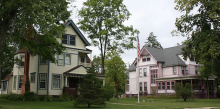Freedom FIBER, Tombigbee Electric Cooperative in Alabama
Huntsville, Alabama, already has high-speed Internet service through Google Fiber, but the surrounding rural areas must look to their local cooperative for better connectivity. Tombigbee Electric Cooperative has started an ambitious Fiber-to-the-Home (FTTH) project to eventually cover its entire service area over four counties in northwestern Alabama.
In a press release, Tombigbee Electric announced that their Freedom FIBER network will start providing Internet service in the towns of Hamilton and Winfield in September 2017. It’ll take about a year to get the new network to everyone in the designated build out area.
Much Needed Connectivity
Hamilton is the seat of Marion county with about 7,000 residents; 20 miles to the south, Winfield has a population of 5,000. As of June 2016, about 75 percent of the population in Marion County does not currently have access to FCC-defined 25 Megabits-per-second (Mbps) download speeds.
With Freedom FIBER, residents will have a choice between two tiers of Internet service: 100 Mbps for $49.95 per month or 1 gigabit (1,000 Mbps) for $79.95 per month. The co-op will also offer phone service for an additional $29.95 each month. The fiber network will be much more reliable than CenturyLink’s DSL network, which is currently the only choice in the towns.
An Incremental Plan



